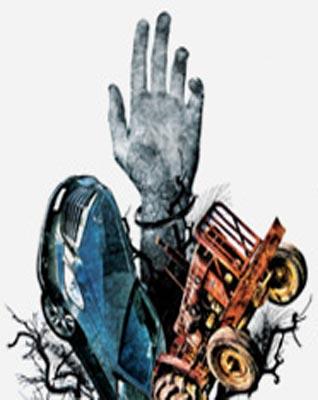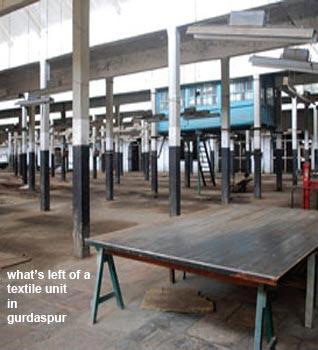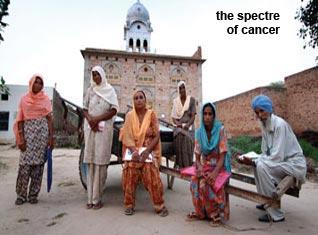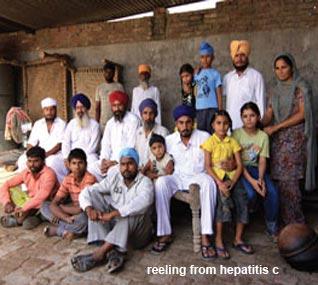Current Events
Punjab: Rich & Ruined - PART TWO
by VIJAY SIMHA
PART TWO - CONCLUSION
Continued from Saturday's "Punjab: The Poverty of Plemty" ...
Despite the boom in the drug trade, it is still not the core activity of Punjab.
The state lives in its fields and that's where the next concern is coming from.
Punjab has 1.5 percent of India's area, producing almost 25 percent of India's wheat and close to 15 percent rice. Almost all of Punjab is cultivable. Everything is so green here that it's like a blessing. So what do the farmers do? They plant rice and wheat, and rice and wheat. The moment they are done with wheat, they get on to rice. This creates a monoculture, planting the same thing and eroding soil quality.
"There's nothing new going in, so the soil has problems. The water table has also gone down because of this," says Manjit Singh, Vice-Chancellor of the Punjab Agricultural University (PAU) in Ludhiana. "They are burning seven kilos of nitrogen, a kilo of phosphorus and 11 kilos of potash for a tonne of paddy. They are burning Rs. 200 crore from their pockets. This causes asthma and other pollutionrelated health problems."
[One crore = 10 million]
Yield is also dropping. In 2000-2001, 45 quintals of wheat was produced per hectare. In 2005-2006, this was down to 40 quintals. It could drop further this year.
Then, there's the urge to feel good. Some estimates say Punjab has 12 lakh tubewells, where six lakh are enough. Most of them use high power pumps, which keep drawing water from the ground. There's such a huge wastage of water and electricity in Punjab that the government is being forced to consider curbs on the use of tubewells and free power to farmers. In many farms, the water pumped out is used to bathe livestock.
[One Lakh = 100,000]
On top of this is the mania for tractors. There are nearly four lakh tractors in Punjab, almost five times the required number. Many small farmers buy expensive tractors on loans and are then unable to clear the debt. In this year's kisan mela at the PAU, farmers converged on brand new machines worth 16 lakh though none of them probably needed them. There's only 1,000 hours of work for a tractor in a year in Punjab. This, experts say, can easily be done by renting tractors instead of buying them.
All of this may have contributed to two lakh farmers leaving farming in Punjab over the past few years. While this is in keeping with the international trend where many are leaving farming, in Punjab there's no thought on how to deal with it. Land holdings are reducing progressively as the land gets divided within families.
There is also a huge concern on the massive use of pesticides, which began with the first Green Revolution. Punjab uses the maximum amount of pesticides in the country and it's got to a stage where it is more like an addiction. More and more chemicals are needed to produce the same amount of grain.
Such is the amount of pesticide in the groundwater that it is believed to be the principal cause of cancer in the Bhatinda belt. Hundreds of cases of cancer occur here, including even Punjab Chief Minister Parkash Singh Badal's wife, who has just returned after treatment from the U.S.
While Badal's wife is able to get decent treatment, the rest of the villagers catch the Jammu Tawi Express between Jammu and Jaipur, which leaves Bhatinda at 9.30 pm every day. So many people take this train for cancer treatment in Bikaner that the train is called the ‘Cancer Train' in Punjab. Every village in the Bhatinda belt has scores of cancer patients, in some cases several in a family. Cancer deaths are common too.
Those who escape cancer are down with Hepatitis C. There are scores in the villages of Punjab, again with little access to medical care. Organic farming, touted as an alternative to chemical farming, is in its infancy here. Estimates say that all the manure in Punjab can only meet 30 percent of the demand for fertiliser. This is not bad to start with, but there is huge resistance among the farmers to make the shift.
This is the backdrop in which talk of a second Green Revolution has begun.
"Green revolutions don't come when you say they should. Nobody has defined a second Green Revolution. We are looking for something we don't know anything about. India produces 234 million tonnes of food grain. We will need more than 400 million tonnes in 2050 when we will be the No. 1 in population. That would be a Green Revolution, nothing else," says Manjit Singh.
* * * * *
While this is the case with agriculture, industry in Punjab too is in trouble.
There is virtually a process of de-industrialisation happening. For instance, there were 127 textile processing units in Amritsar in 1990. There are now only 20. Ludhiana, the industrial hub of Punjab, is in the process of shifting small-scale industries out of city limits. This has resulted in a sealing drive similar to the one in Delhi some time ago. Large-scale units have held on, mainly Hero in the cycle industry and Oswal in the woollens sector. But industry in the rest of Punjab is shifting out.
Says Amarjit Singh, President of the Corduroy Manufacturers Association of India: "First, Uttarakhand and Himachal Pradesh have a tax holiday and several subsidies. Punjab is like dry roti. They are like bread and butter. I don't need a passport to cross over. Those who can, have gone.
"Second, Punjab has acute shortage of electricity. There will be no shortage of power in Himachal for the next 50 years. Third, the infrastructure is poor in Punjab. The roads are bad and pollution clearance is extremely difficult. Fourth, land prices are exorbitant in Punjab. Why should anyone waste money on it?"
So, the decline in agriculture and industry has a clear cause and effect equation. In agriculture, there is an attitude issue and it is beginning to hurt. The Punjab farmer overspends on pesticide, tubewells and tractors, and overdraws on water. He is in a hurry and hurts the soil and environment in the process. In industry, there is an issue of investment and profit; so they are moving to better options in neighbouring states. The larger industry is able to hold on but the medium and smaller units have moved on.
These are reversible trends.
It's the dependence on alcohol and drugs though that is the killer.
It has taken years of indulgence for Punjab to reach a crisis situation in alcohol dependence. It's taken far fewer years for drug abuse. This is mainly because the rich have too much money and nothing to do. Many have sold land in villages to cash in on the land boom. The poor in any case have nothing to do because there are far fewer jobs. So the rich do IMFL and heroin. The poor do PML, pills and poppy husk.
It's such a given that farm owners buy strips of painkillers as part of the deal with the labour. In many cases, farm labour settles for Rs. 200 a day and two strips of pills. And it's all part of the great gregarious Punjabi. They have convinced themselves that they are tough and funloving. So, it's not a problem. This is what worries Ravneet Singh, president of the Punjab Youth Congress and Lok Sabha member.
Ravneet Singh came through a tough election process, the first initiated by Rahul Gandhi in the Youth Congress. He is the grandson of Chief Minister Beant Singh, who was assassinated in office.
"Part of the problem is that this is the new war. In future, armies will not fight, so this could be Pakistan's gameplan to weaken Punjab. Then, our system is totally corrupt. They do nothing though they see that every village has at least two chemists though there is no hospital for miles. Half a village leaves for the U.S. and the other half has earned money through sale of land. They get into drugs. It's so serious that Rahul Gandhi has asked us not to ask people for votes and reach every home instead. He has asked us to drop everything and get on the drug front. I believe a whole race is under threat going by the levels of impotence caused by drugs. We may have lost this generation but I am intent on saving the next one. We want an end to indiscriminate medical shops. We want villages where no one below 35 dies. We want to socially boycott drug dealers. We want the elders to sit in protest outside pharmacies. We want to put the names of peddlers on the walls. If we do this, we may still save Punjab. Else, I think Punjab won't reach the year 2050," says Ravneet Singh.
* * * * *
This volatile mix is putting life into a section of people who've largely been dormant for 20 years or so, the militants who fought in the Khalistan movement. Simranjit Singh Mann is busy canvassing for Khalistan in a series of public engagements. His party, the Shiromani Akali Dal (Amritsar), hopes to win some seats in the next Assembly poll 18 months away.
"We have been left holding the baby. Others who were with us, like Parkash Singh Badal and Amarinder Singh, have joined more profitable parties like the Akali Dal (Badal) and the Congress. We will not rest until we get Khalistan, but this time I am fighting a peaceful and democratic battle," says Simranjit Singh.
Sandeep Kaur, widow of slain militant Dharam Singh Kashtiwal, keeps the memory of Operation Bluestar alive in a trust she runs in Amritsar. "Our wounds are still raw," she says, "how can we be at peace?"
Concerns are more immediate in a small school in one of Punjab's more notorious colonies, Maqboolpura in Amritsar, a wasteland of families ravaged by drugs and alcohol. Parvjot, a precocious four-year-old, is conversing with Sarbjeet Kaur, a teacher. The conversation is easily the most important in Parvjot's life. Her admission into school depends on what she says. Suddenly she turns to the teacher. "Would you like a drink? My grandmother makes liquor at home. Many people drink it every night and give money," she says. It was 9.30 am and Sarbjeet wasn't thinking of a drink. She looked at Parvjot and asked: "Would you take money from me also?" The reply was instant. "No. For you, we'd give it free."
CONCLUDED
[Courtesy: Tehelka]
September 27, 2010
Conversation about this article
1: N. Singh (Canada), September 27, 2010, 3:24 PM.
I would like to bring to your readers' attention a recent study. Although not directly relevant to the article, it does raise the issue as to why the Sikh diaspora is flourishing and the Sikhs in Punjab are not ... my personal guess! There are anti-Sikh policies in place in India designed to ruin the Sikhs on all levels. How else would you explain this? Heights and weights of five subgroups of Asian (545) and European children (685) were recorded after birth, at 1 year, 2 years, and at 5 years. Asian children were divided into Muslim, Gujarati, Muslim-Pakistani, Muslim-Bangladeshi, Hindu, and Sikh. Although the Europeans were significantly the heaviest at birth (3.42 kg boys and 3.26 kg girls) when compared with any of the other groups, it was the Sikhs who had the best weight gain. They were also the heaviest at 5 years when compared with other groups, including the Europeans (20.13 kg and 19.22 kg for Sikh boys and girls respectively, compared with 18.83 kg and 18.42 kg for European boys and girls respectively). Hindus had the lightest birth weight. Their weight at 5 years (17.41 kg boys and 16.93 kg girls) and that of the Muslim-Gujaratis (17.27 kg boys and 17.20 kg girls) was comparable and was lowest, whereas that of the Bangladeshis at this age was the greatest among the Muslims (18.56 kg for boys and 17.87 kg for girls). Sikh boys and girls were found to be the tallest of all the groups, including the Europeans, at all periods of measurements - including at 5 years when the Sikh boys and girls were 3 cm and 1.5 cm taller than the European boys and girls. Hindus were the shortest of all the groups throughout the period of study http://adc.bmj.com/content/71/3/207.abstract
2: N. Singh (Canada), September 27, 2010, 3:47 PM.
Interesting article. However, I am disappointed at the lack of depth of the analysis. It looks at the symptoms and not the cause! For example, no mention is made that use of tubewells is on the rise because Punjab's river waters are being diverted to Rajasthan and Haryana, and Punjab has yet to see a single cent in royalties for this. No mention is made that rice cultivation (which is water intensive, and not the natural product or the staple diet of Punjab) has been actively encouraged by the Indian government through constraints and levies on wheat production. There are no controls in Punjab on the availability and use of pesticides although these pesticides are not available in other Indian states through regulation. Rather, the article portrays Punjabi farmers as 'pesticide' hungry and irresponsible. I am disappointed at the level of journalism displayed in this article and it is not worthy of such a publication as 'Tehelka'!
3: Kalyan Kaur (Chandigarh, Punjab), September 27, 2010, 3:53 PM.
Pakistan is always the bogeyman in this country. Blame is wrongly being directed to the farmers themselves, and to the Pakistanis. For the real culprits, you need go no further than the Government of India in Delhi! This article is mischievous and merely pulling the wool over our eyes.
4: Dr. Birinder Singh Ahluwalia (Toronto, Ontario, Canada), September 27, 2010, 6:41 PM.
I believe all the issues raised re Punjab are rectifiable at this stage, all that needs to be done is to formulate good, solid, thoughtful policy(ies) to tackle these issues and implementation of such policy(ies) in an open, accountable and honest manner. If nothing is done now, then the situation may reach an irreversible stage which will be catastrophic ... which we all don't want. So, let us all do our part (as responsible global citizens) and assist Punjab in overcoming all that is being touted wrong about it - in fact we should all work to assist all parts of the world that require assistance to survive - it is our duty!
5: Baljit Singh Pelia (Los Angeles, California, U.S.A.), September 27, 2010, 10:19 PM.
Sant Jarnail Singh, in his infinite wisdom and foresight, saw this coming and tried to make a change. He was labeled a terrorist and a separatist and murdered. People like Badal and Beant who sold out Punjab are now being rewarded by passing on this rule to their sons like Sukhbir and Ravneet so that they can carry on these policies till this great state, it's proud people, a vibrant culture and, most of all, the great Sikh people, are decimated.
6: Gurteg Singh (New York, U.S.A.), September 27, 2010, 11:32 PM.
Most (if not all) problems the Sikh nation is facing - including the possibility of Sikh identity being wiped out from Punjab, is the direct result of our occupation by a cunning, corrupt, criminal and ruthless gang for the last six decades. Unless Sikhs can break the chains of slavery, the future looks very bleak.
7: Taran (London, United Kingdom), September 28, 2010, 5:57 AM.
I do not agree with the writer as he has portrayed Ravneet Singh (grandson of the Butcher, Beant Singh) in a very positive shade. In fact this fellow Ravneet Singh is nothing but another political heir of his crooked family. Does anyone remember the Katia case where the grandsons of this clan kidnapped and raped a French tourist in Chandigarh? Gurkirat - he is his brother and pretty much like them. His right hand man is Jagmohan Kang who himself was an MP and was a renowned gunda in his heyday and even now. Also, I do not agree with Simranjeet Singh as he is gone wacko and has hardly accommodated any genuine, strong, emerging politicos on his dais. He seems to be doing a one man show. [He had been brutally tortured by the Indian govt. post 1984 - looks like substantial and permanent damage was inflicted then.] Yes, the other things written by the writer are true to some extent. But everyone is aware of all this mess. The blame lies with the state and central governments and our Sikh bodies who have made Sikhi a corporate hub and club and have turned a blind eye to the plight of rural and urban Sikhs who are enduring infinite socio-economic challenges.
8: Bobby Singh Sirah (Sutton Coldfield, England), September 28, 2010, 7:51 PM.
Kalyan Kaur ji: the only mention of Pakistan in this article is in relation to the smuggling of heroin into India from there. This is just a fact. The drugs come from Afghanistan across Pakistan and into Punjab. And it only takes place because there are corrupt people in Punjab who smuggle it to make money.
9: N .Singh (Canada), September 29, 2010, 10:09 AM.
Bobby: The issue of drugs in Punjab is controversial. I for a fact witnessed as far back as 1986 Punjab police distributing drugs to youth. I believe this is along the lines of the CIA and their activities with black youth in America. Secondly, the article argues that the king-pins are in Delhi, not Punjab, and that Punjab is just the route. I agree with Kalyan Kaur ji. In India, the bogeymen are always Pakistan and China, deflecting attention from the real cultprits: the Indian government.
10: Bobby Singh Sirah (Sutton Coldfield, England), September 30, 2010, 10:37 AM.
N.Singh - I have relatives whose lives are blighted by heroin in Punjab. Many of the pushers are locals. The smack is sent on to Delhi and Mumbai, because it can be disseminated from there, and sold there too, as major population centres.
11: Lakhveer Singh Dhillon (Mumbai, India), October 04, 2010, 12:04 PM.
I love Punjab. Mujhe garv hai Sardar hone ka.
12: Tajinder Kaur (Thane, India), October 10, 2010, 6:48 PM.
We cannot turn our face from reality, the situation in Punjab is spiralling downwards, whether it be due to bad politics or other reasons. The root cause of all issues in Punjab is illiteracy in villages. Educated people should come forward and make the masses aware of reality. Children in Sikh families are not interested in changing their attitude. Although Sikhs adopt quickly to new technology, they do not change their attitude towards education, positive reasoning and faith. So our basic strategy should be to educate them morally. "Gyan bin ghor andhear". Punjabis are making a lot of money but not investing in their future, i.e., their children and culture.






